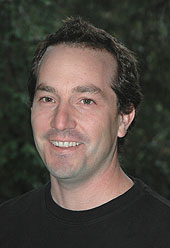March 27, 2006
Gene researcher Joshua Stuart awarded prestigious Sloan Research Fellowship
By Tim Stephens
The Alfred P. Sloan Foundation has selected Joshua Stuart, an assistant professor of biomolecular engineering, as a Sloan Research Fellow.

Joshua Stuart
Photo: Tim Stephens |
The prestigious two-year fellowship provides an award of $45,000 to support Stuart's research, which focuses on the development of computational tools for studying how genes work and identifying networks of genes involved in important biological functions.
Ultimately, researchers can use these tools to explore the underlying genetic causes of human diseases and develop new therapies.
The Sloan Research Fellowships are intended to enhance the careers of the very best young faculty members in specified fields of science. A total of 116 fellowships are awarded annually in seven fields, including computational and evolutionary molecular biology.
Stuart has done pioneering work on computer algorithms for analyzing the results of "microarray" experiments that probe the activities of thousands of genes simultaneously. His computer programs help researchers identify genes that work together and figure out the functions of different genes. These efforts are shedding light on the complex networks of interacting genes that orchestrate the activities of living cells.
"A lot of the work in my lab aims to get a view of what a gene does in the context of the whole network of genes that it interacts with," Stuart said.
His lab is involved in various collaborations with molecular biologists and geneticists at UCSC, Stanford University, and other institutions. A common theme throughout his work is the development of bioinformatics tools that are not only useful to his current collaborators, but can serve as a general resource for other researchers.
"I get satisfaction in seeing people share insights and use these resources for other purposes," Stuart said. "When we find a network of genetic interactions, it's like a big encyclopedia of links. So if you're a biologist, you can look up the gene you're interested in and see what other genes it interacts with."
The emergence of DNA microarray technology in the 1990s has led to an explosion in the amount of information scientists are able to gather about the activities of large numbers of genes in different kinds of cells and under different conditions. When scientists publish the results of a microarray experiment, they deposit the raw data into one of several publicly accessible databases, such as those maintained by the National Center for Biotechnology Information (NCBI).
According to Stuart, these databases are largely an untapped resource. A single microarray experiment generates an enormous amount of data. The researchers who conduct the experiments analyze the data to answer a particular question, but the raw data may hold answers to many other questions as well. Stuart is developing a variety of tools to make it easier for researchers to explore the databases and extract new information from them.
"Most molecular biologists will at some point use a microarray in their research, so the data are just pouring into the databases," he said. "Microarrays and similar technologies have launched biology into its own digital age, but we still need a search engine that allows us to tap into the richness of the data that's out there, like a Google for biological data."
One of Stuart's tools is a kind of search engine for gene activity data that was inspired by the online recommender systems used in e-commerce web sites. Movie recommenders, for example, suggest new movies a user might like based on the user's previous choices. Stuart's gene recommender is designed to help researchers studying the genes involved in a particular biological pathway, such as the series of molecular interactions that tell a cell when to stop growing. Researchers can submit a set of genes known to be involved in their pathway, and the search engine will generate a list of other genes ranked according to their probability of being involved in the same pathway.
Stuart's group tested the gene recommender on data from a common laboratory model for studying the retinoblastoma tumor pathway. They discovered two new genes involved in the pathway, representing new potential points of attack for therapies designed to block tumor formation.
"This is a pathway that people have been studying for 20 years, so for us to find two new genes is amazing. It's a very promising approach, but I think it is only one of many such tools that we will have in the future," Stuart said.
Stuart is affiliated with the Center for Biomolecular Science and Engineering at UCSC. He is part of a growing group of researchers in the Baskin School of Engineering whose work crosses disciplinary boundaries and involves interactions with researchers in molecular, cell, and developmental biology and other fields outside of engineering.
Stuart earned a B.S. in computer science and B.A. in molecular, cell, and developmental biology from the University of Colorado, Boulder, and a Ph.D. in biomedical informatics from Stanford University. He joined the UCSC faculty in 2003.
 Email this story
Email this story
 Printer-friendly version
Printer-friendly version
 Return to Front Page
Return to Front Page